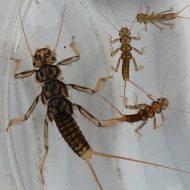Would you like to become a Saltwater Detective?
APPRECIATION OF OUR ESTUARIES & SEASHORE TRAINING COURSE
with Ken Whelan, Padraic Creedon & Friends
COUNTY LOUTH
Louth Leader Partnership, Ken Whelan, Padraic Creedon – Leave No Trace-Ireland, Cushla Dromgool-Regan – Camden Education Trust, and friends are delighted to be running the APPRECIATION OF OUR ESTUARIES & SEASHORE TRAINING COURSE in April 2022.
This is an introductory course for adults, volunteers and community groups that wish to become a SALTWATER DETECTIVE and learn about the amazing range of marine animals, plants, seaweeds and birdlife found at our local estuaries and seashores in County Louth.
Two separate courses are provided, one in Carlingford and the other in Clogherhead, County Louth.
North Louth – Carlingford
Classroom: Sun 3rd April 9.30am – 3.30pm (Blackrock Community Centre, Dundalk)
Seashore fieldtrip: Sat 9th April 10am – 2pm
Estuary fieldtrip: Sun 10th April 11am – 3pm
South Louth – Clogherhead
Classroom: Sat 2nd April 9.30am – 3.30pm (Drumshallon Forge Heritage Centre, Drogheda)
Seashore fieldtrip: Sat 23rd April 10.30am – 2.30pm
Estuary fieldtrip: Sun 24th April 12pm – 4pm
Download your BOOKING FORM below and return to saltwaterdetective@gmail.com
Places are limited and your booking must be confirmed prior to the course start date.
Bookings close: 30th March
The North and South Louth courses are delivered in three parts:
Day 1. An introductory class held in a local centre, which will include exciting presentations, discussions and tasks, where participants will learn how to identify animals and plants that live within the estuaries and on a typical rocky seashore. The content will also include developing the participants understanding of the tides, types of seashores, how a seashore is divided (zonation), safety & conservation, as well as useful equipment for the fieldtrips. The facilitators will provide practical tips identifying animal species, seaweeds and plants found in key locations the upper, lower and middle seashore as well as on the estuary. Invited guests will also provide visual and practical presentations of other wildlife including birdlife and marine biodiversity.
In addition to learning about our the incredible saltwater biodiversity, the course will offer participants an opportunity to develop ideas to share and engage with their community about understanding and caring for their local saltwater environment.
Day 2. The seashore fieldtrip will involve a hands-on approach where participants will learn how to find animals in a rocky shore environment. They will also get to examine and learn to identify seaweeds, animals in rockpools, as well as evidence of other species on the seashore. A three-minute beach clean will also be conducted, where the team and participants will discuss concepts for environmental care and community projects.
Day 3. The estuary exploration will include an examination of a local estuary where connections will be made from the inland environment and sources of freshwater to the shore – examining estuary landscape, birdlife, resident animals and animals transitioning through the fresh / saltwater interface . Aspects of environmental conservation and protection will be discussed throughout the hands on practical learning experience.
What will you need to be a Saltwater Detective?
The fieldwork content will include practical exploration building the participants sense of confidence and excitement in discovering animals, plants and seaweeds. Each participant will be encouraged to explore and find key animals, seaweeds and plants, creating a stronger appreciation of their local environment, biodiversity, heritage and their connections with estuaries and the seashore.
Participants will be provided with the Saltwater Detective tools to conduct their investigations. It is recommended that you bring with you a mobile phone (camera) to photograph animal species throughout the day.
Suggested items you might bring with you:
- Raingear, gloves, hat, flask, wellies / strong boots, lunch
- Sketch or notebook
- Binoculars / scope
- Eye lens or magnifying glass
- Identification books / ID cards, etc.
- Company – learn with others, with one another……..
- Awareness, avoid disturbing the birds or mammals
Please note:
- Photos: Weplan to take some photographs during the course for use on social media and for promotional purposes. If you would prefer not to be photographed or to have your photo used in reporting on the course or publicising future courses, please do let us know.
- Health Issues: If you have any health issues we should be aware of, please let us know, in confidence, before the course.
- Covid …and not forgetting the usual Covid-19 precautions, as you feel appropriate – hand washing, masks, social distancing.
The course is run by Ken Whelan (www.kenwhelan.info), Cushla Dromgool-Regan – Camden Education Trust, Padraic Creedon – Leave No Trace Ireland. A number of guest facilitators will also be joining us.
This project has been funded by the EU through the LEADER Partnership and Development of Rural & Community Development

